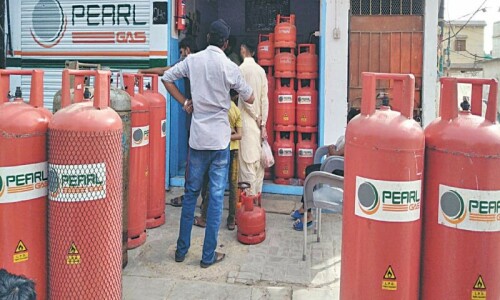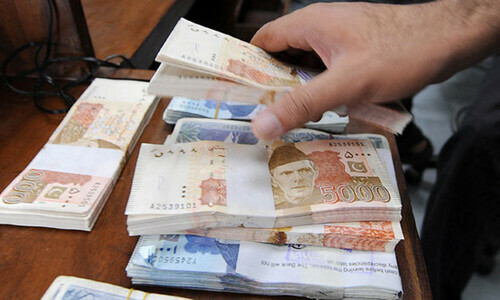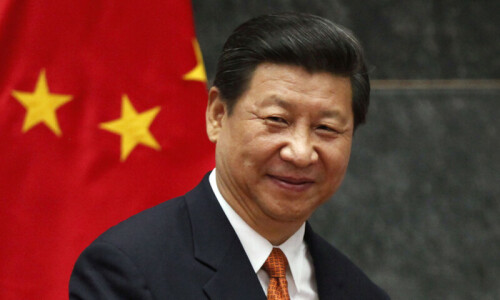GOING by what we are hearing these days, it seems the country’s economy is in the middle of a rebound, or at least according to the words of government ministers. Planning Minister Asad Umar has been talking about a ‘V-shaped recovery’ since at least August, when the Covid-19 lockdowns were largely gone. Prime Minister Imran Khan has been talking about a ‘recovery’ in the economy since at least November. And the commerce adviser, Razzak Dawood, makes it a point to share export data and congratulate the country on their rising trend every month.
So is it true that the economy is indeed recovering? Consider first that all projections for where the economy will stand by the end of this fiscal year range between 0.5 per cent GDP growth and 2.5pc. The IMF said 1.1pc most recently and the World Bank said 0.5pc only a week ago. The State Bank estimated GDP growth to fall between 1.5pc and 2.5pc, citing the second wave of Covid-19 as a key risk. The International Institute of Finance projected 1.8pc back in August and only today Moody’s forecast GDP growth to come in at 1.5pc by the end of this fiscal year.
You can spin these numbers if you like. A determined soul could argue that since growth was negative last year, even positive 2pc growth this year is an impressive recovery. Or the same determined soul might argue that this trend is likely to accelerate given what is happening in the large-scale manufacturing indicator, which shows accelerating output growth among large manufactures every month.
What you cannot do, however, is refer to 2pc GDP growth as some sort of ‘recovery’, unless by recovery you mean only that the economy has recovered from the jolt of the Covid-19 lockdowns, which didn’t last very long in Pakistan. Even if we double this projection, and argue that by the end of the fiscal year the growing activity we see in industry today will accelerate to the point where it will blow past all projections made by everybody and come in at 4pc (double what the more optimistic projections are showing), even then you don’t have a very sharp ‘recovery’, only a slow grinding return of economic activity after at least two years of moribund performance.
There is rampant under-invoicing of exports going on. The PM is being taken for a ride.
Whenever you hear the government proclaim triumph about rising exports, keep in mind that the trade deficit has grown even faster than exports in the same July to December period. The month of December saw a sharp rise in the trade deficit, up by almost a third from the same month last year, and if the past is any guide, then whenever we have rising periods of growth we also see a rising trade deficit which eventually swamps growth because the foreign exchange reserves deplete. It is too early to say that the December trade figures show a return of this trend though, but if the trade deficit continues rising in the months of January and February, we will be in a position to ask whether yet one more unsustainable growth spurt has been engineered in the country.
Even more importantly, though, whenever we look at the rise in exports we have to ask at what cost these have been brought about. For example, add up all the freebies and handouts the government has given to exporters all through 2020, at an accelerating clip, and then add up all the incremental export proceeds that these chaps have brought back into the country. Between subsidies on fuel, power and credit, the bonanza from a sharp fall in interest rates — that fell to just over half their level in a matter of weeks once the lockdowns began and have remained there ever since — the massive rescheduling of their loans that the State Bank arranged for them, and sharp breaks on taxes and custom duties, you have a figure of almost Rs2 trillion that have been poured into industry as a whole. It is hard to determine how much of this went to exporters specifically, but they are the beneficiaries of a very large share of government largesse.
In return, exports have increased by $574 million in the first six months of the fiscal year compared to the same period last year, equal to around Rs92 billion at an exchange rate of 160. It is difficult to calculate how much largesse the exporters have actually absorbed through all the various ways the government has showered it upon them, but it is a safe bet that it is far larger than Rs92bn.
So what’s going on? I’ve said before that there is rampant under-invoicing of exports going on, and I repeat that once again. These guys are basically taking the prime minister for a ride. It is also possible that many among them are then routing some of this money accumulated abroad via under-invoicing back into the country in the form of remittances, which might help explain why the latter remain elevated above the $2bn level for many months now.
Why would they do this? Because there are enormous benefits for them to bring that money back and pour it into real estate investments instead, since that sector is on the cusp of a boom brought about by nearly Rs186bn of black money entering via an amnesty scheme, coupled with an equally massive set of government handouts.
So no, the economy is not turning around or recovering. It is in the early stages of what might become a growth spasm driven by massive state inducements of the sort we have seen before and which inevitably lead to a crash. And the drivers of that growth are narrowly huddled in property development and allied industries, and textile exports, with some knock-on effects rippling through the system. Investment without savings or expenditures without revenues are like a drug for any economy. Let’s see what happens to this gravy train once the IMF programme resumes.
The writer is a business and economy journalist.
Twitter: @khurramhusain
Published in Dawn, January 14th, 2021















































